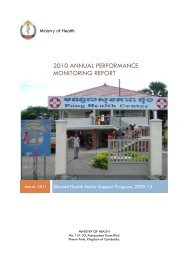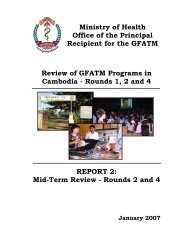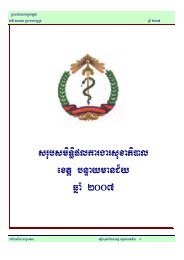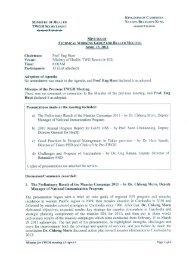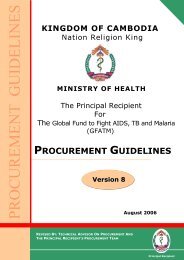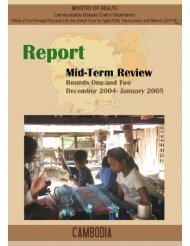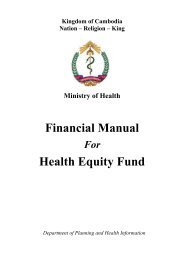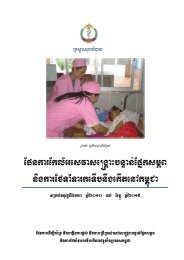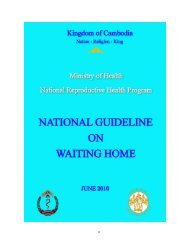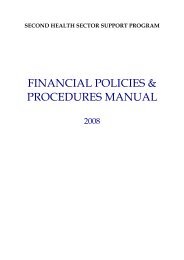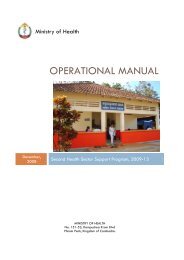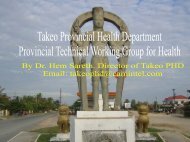Joint Annual Performance Review 2007 - Ministry of Health
Joint Annual Performance Review 2007 - Ministry of Health
Joint Annual Performance Review 2007 - Ministry of Health
You also want an ePaper? Increase the reach of your titles
YUMPU automatically turns print PDFs into web optimized ePapers that Google loves.
In order to support the MoH to implement the provisions <strong>of</strong> the National Policy, a<br />
roadmap (also referred to as master plan for QI) was created which identifies 5 key<br />
strategies – empowering consumers, institutional management, clinical practice,<br />
pr<strong>of</strong>essional development and management development. These have to be spearheaded<br />
by dedicated working groups that will take lead in the different but related activities for<br />
each strand.<br />
In 2006, 1 formal group – Clients Rights WG – and 2 informal groups – <strong>Health</strong><br />
Technology Assessment (HTA) Core Group and the Hospital Reform Group showed<br />
specific outputs which are related to the National Policy. These 3 groups are being<br />
considered to take the role for the first 3 strategies.<br />
Reports and minutes <strong>of</strong> meeting detailing the activities <strong>of</strong> the Clients Rights WG, the<br />
HTA Core Group and the Hospital Reform group are available with the QAO, NCHP and<br />
GTZ.<br />
Two other working groups – on pr<strong>of</strong>essional development and management development<br />
need further work but the key players have already been identified by the QIWG. The<br />
QAO will take lead in furthering the discussions.<br />
• Assist in the development and testing <strong>of</strong> a national licensing and accreditation system for<br />
public and private health facilities according to the agreed priorities;<br />
Preliminary work on development <strong>of</strong> accreditation standards and tools for private clinics<br />
started in November 2006 in collaboration between PSI-KfW-GTZ-QAO, as another<br />
piece in implementing the National Policy. The QAO is the chair <strong>of</strong> the Task Force on<br />
Accreditation for this collaboration.<br />
The QAO has been involved from the beginning as regards the development <strong>of</strong> an<br />
Accreditation system for the Cambodian health sector. Hence, they have been active<br />
members in the consultancy missions in 2006 <strong>of</strong> Dr Charles Shaw and Dr Madeleine<br />
Valera. They attended meetings and worked on documents that were pertinent to the<br />
consultancies.<br />
• Ensure availability and accessibility <strong>of</strong> resource materials related to quality assurance, in<br />
coordination with the MoH library and NIPH and website;<br />
The QAO keeps an inventory <strong>of</strong> the most recent documents shared by other organizations<br />
and partners on QI. Ideally, these documents can be better used if they were integrated<br />
and shared by most, if not all, relevant agencies in the health sector. This has been<br />
mentioned several times in many reports, including that <strong>of</strong> Dr Shaw's. This is all very<br />
good and the QAO and other health partners agree with this. But the current situation in<br />
Cambodia does not yet permit us to achieve this in full.<br />
Primarily, the QAO has no authority over the vertical programs to enable it to set<br />
directions on how to proceed with, for instance, clinical guideline development. The<br />
QAO is currently seen as keeper <strong>of</strong> the documents, not yet an analyser nor an expert that<br />
can provide input to the vertical programs.,The vertical programs themselves have their<br />
own systems for technical and administrative matters. To some degree they do not yet see<br />
- 43 -



